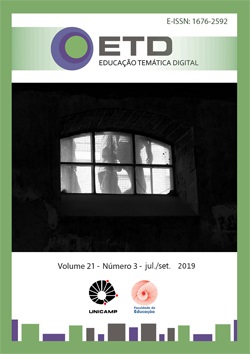Abstract
Digital games are considerably new artifacts in the history of childhood and they can be understood from various perspectives. In this article, we reflect on digital games and children from the perspective of the sociology of childhood. The first reflection encompasses the stigma suffered by digital gamers due to the symbolic relation between games and children, mediated by an adultcentric view. The second describes digital games as framing structures for play, consequently influencing the ways children are initiated in their culture. We discuss, thus, not only the potential influences of digital gaming, but also children’s possibilities to transgress and construct their own meanings, actively interacting with those cultural artifacts. The third problematizes the notion of ‘game generation’, highlighting the heterogeneity of each generation. The fourth emphasises the importance of listening to children’s voices in academic research when games and childhood are addressed. The reflections aim to enrich the academic discussions, both in the field of digital games and in the field of childhood, raising elements which deserve further and deeper attention and problematizing the role of adults in the relations between children and digital games.
KEYWORDS: Digital games. Sociology of Childhood. Playfulness. Child. Adultcentrism.
References
ABRAMOWICZ, A. A pesquisa com crianças em infâncias e a sociologia da infância. In: GOULART, Ana Lúcia; FINCO, Daniela (Org.) Sociologia da infância no Brasil. Campinas: Autores Associados, 2011. p. 17-36.
ALBUQUERQUE, R. M. Letramento eletrolúdico como conscientização: bases teóricas para educar o jogar. Currículo sem Fronteiras, v. 14, p. 57-74, 2014.
ALBUQUERQUE, R. M. Digital game education: designing interventions to encourage players’ informed reflections on their digital gaming practices. 2016. Tese (Doutorado em Educação) - Learning Sciences Research Institute, University of Nottingham, Nottingham (UK), 2016.
ALBUQUERQUE, R. M. Como a curiosidade pode enriquecer o jogar?. In: Daniela Karine Ramos; Dulce Márcia Cruz. (Org.). Jogos digitais em contextos educacionais. Curitiba: CRV, 2018, p. 91-104.
ALBUQUERQUE, R. M.; AINSWORTH, S. Unintentional learning: are digital games friends or foes? In: Rosemary Luckin. (Org.). Enhancing learning and teaching with technology: what the research says. London: Institute of Education Press, 2018, p. 101-109.
ALBUQUERQUE, R. M.; CRUZ, D. M. Letramento digital através de criação de jogos eletrônicos: ensaio comparativo sobre dois contextos escolares. Revista NUPEM (online), v. 5, p. 123-143, 2013.
BUCKINGHAM, D.; BURN, A. Game literacy in theory and practice. Journal of Educational Multimedia and Hypermedia, v. 16, n. 3, p. 323-349, 2007.
COSTA, M. F. V. O brincar em narrativas autobiográficas: um estudo intergeracional. Educação Temática Digital, v. 12, n. esp., p. 107-123, 2010.
CORSARO, W. A. Sociologia da infância. Porto Alegre: Artmed, 2011.
CRUZ, D. M.; ALBUQUERQUE, R. M. A produção de jogos eletrônicos por crianças: narrativas digitais e o RPG Maker. Comunicação e Educação (USP), v. 19, p. 111, 2014.
CRUZ, D. M.; RAMOS, D. K.; ALBUQUERQUE, R. M. Jogos eletrônicos e aprendizagem: o que as crianças e jovens têm a dizer? Contrapontos (UNIVALI), v. 12, p. 87-96, 2012.
ENTERTAINMENT SOFTWARE ASSOCIATION. 2015 Sales, Demographic and usage data: essential facts about the computer and video game industry. Disponível em: http://www.theesa.com/wp-content/uploads/2015/04/ESA-Essential-Facts-2015.pdf . Acesso em: 10 nov. 2016.
FERREIRA, A. F.; DARIDO, S. C. Os jogos eletrônicos no cotidiano dos alunos do 9° ano do ensino fundamental. Educação Temática Digital, v. 15, n. 3, p. 595-611, 2013.
FINCO, D.; OLIVEIRA, F. A sociologia da pequena infância e a diversidade de gênero e de raça nas instituições de educação infantil. In FARIA, A. L. G.; Finco, D. (Org.) Sociologia da infância no Brasil. Campinas: Autores Associados, 2011. p.55-80.
GARCIA, D. E. S. Letramento em design de games: jogando, criando e compartilhando textos videolúdicos. 2016, 304f. Tese (Doutorado em Letras) - Universidade Católica de Pelotas, Pelotas, RS, 2016.
GEE, J. P. What Games have to teach us about learning and literacy. New York: Palgrave MacMillan, 2007.
KOWERT, R.; QUANDT, T. The video game debate: unravelling the physical, social, and psychological effects of digital games. New York: Routledge, 2016.
LUZ, A. R. Video games história, linguagem e expressão gráfica: do nascimento à consolidação do vídeo game como linguagem. São Paulo: Blucher, 2010.
NASCIMENTO, M. L. P. B. Reconhecimento da sociologia da infância como área de conhecimento e campo de pesquisa: algumas considerações. In: GOULART, Ana Lúcia; FINCO, Daniela (Org.) Sociologia da infância no Brasil. Campinas: Autores Associados, 2011. p. 37-54.
PRENSKY, M. Digital game-based learning. New York: McGraw-Hill, 2001.
STEINKUEHLER, C. Parenting and video games. Journal of Adolescent & Adult Literacy, v. 59, n. 4, p. 357-361, 2015.
STEVENS, R.; SATWICZ, T.; MCCARTHY. In game, in-room, in world: reconnecting video game play to the rest of kid's lives. In: SALEN, K. (Ed.). The ecology of games: connecting youth, games, and learning. Cambridge: The MIT Press, 2008. p.41-66.
VIGOTSKI, L. S. A formação social da mente: o desenvolvimento dos processos psicológicos superiores. 7. ed. São Paulo: Martins Fontes, 2007.
WILLIANS, D.; YEE, N.; CAPLAN, S. Who plays, how much, and why? A behavioral player census of a virtual world. New Media & Society, v. 11, n. 5, 2009.
The ETD - Digital Thematic Education uses the Creative Commons license (CC), thus preserving the integrity of the articles in an open access environment.

